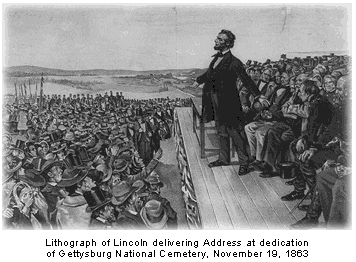 The Gettysburg Address was a short speech delivered by President Abraham Lincoln at the site of the Battle of Gettysburg in Pennsylvania. It was given at ceremonies to dedicate a part of the battlefield as a cemetery for those who had lost their lives in that costly Civil War battle.
The Gettysburg Address was a short speech delivered by President Abraham Lincoln at the site of the Battle of Gettysburg in Pennsylvania. It was given at ceremonies to dedicate a part of the battlefield as a cemetery for those who had lost their lives in that costly Civil War battle.
"Four score and seven years ago, our fathers brought forth upon this continent a new nation: conceived in liberty, and dedicated to the proposition that all men are created equal. Now we are engaged in a great civil war, testing whether that nation, or any nation so conceived and so dedicated, can long endure. We are met on a great battlefield of that war. We have come to dedicate a portion of that field as a final resting place for those who here gave their lives that that nation might live. It is altogether fitting and proper that we should do this. But, in a larger sense, we cannot dedicate. . .we cannot consecrate, we cannot hallow this ground. The brave men, living and dead, who struggled here have consecrated it, far above our poor power to add or detract. The world will little note, nor long remember, what we say here, but it can never forget what they did here. It is for us the living, rather, to be dedicated here to the unfinished work which they who fought here have thus far so nobly advanced. It is rather for us to be here dedicated to the great task remaining before us, that from these honored dead we take increased devotion to that cause for which they gave the last full measure of devotion... that we here highly resolve that these dead shall not have died in vain, that this nation, under God, shall have a new birth of freedom, and that government of the people, by the people, for the people, shall not perish from the earth."Numerous spurious accounts have sprouted up around this famous speech. One story has it that the president used the back of a brown envelope to jot down his thoughts while on the train to Gettysburg. According to another tale, the people did not care for his speech. However, the occasion's principal speaker, Edward Everett, penned the following to Lincoln, "I should be glad if I could flatter myself that I came as near to the central idea of the occasion in two hours as you did in two minutes." Abraham Lincoln answered him, "In our respective parts yesterday, you could not have been excused to make a short address, nor I a long one. I am pleased to know that, in your judgment, the little I did say was not entirely a failure." Many newspapers also immediately reported positively on the president's brief remarks. However, there was no definitive text of the speech and variations appeared. The text above is considered to represent Abraham Lincoln's Gettysburg Address as faithfully as possible.